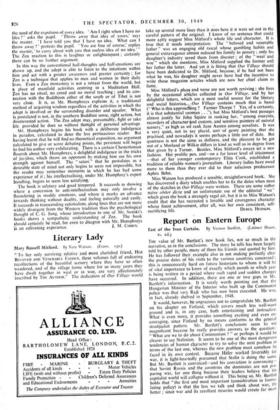Literary Lady
Mary Russell Mitford. By Vera Watson. (Evans. iss.) "To her only surviving relative and most cherished friend, HER BELOVED AND VENERABLE FATHER, these volumes full of endearing recollections of the beautiful scenery where they have so often wandered, and of the village home where for so many years they have dwelt together in weal or in woe, are very affectionately inscribed by THE AUTHOR." The dedication of Our Village would take up several more lines than it does here it It were set out in the careful pattern of the original. I know of no sentence that could more aptly suggest Miss Mitford's whole life and character. It is true that it needs interpretation. The " beloved and venerable father " was an engaging old rascal whose gambling habits and general extravagance almost reduced his family to penury ; only his daughter's industry saved them from disaster ; of the " weal and woe" which she mentions, Miss Mitford supplied the former ana her father the latter. And yet it is fitting that Our Village should have been dedicated to Dr. Mitford, because, if he had not been what he was, his daughter might never have had the incentive to write those magazine articles which are now her chief claim to fame.
Miss Mitford's plays and verse are not worth reviving - she lives by the occasional articles collected in Our Village, and by her delightful letters, which are a most useful source for the literary and social historian.. • Our Village contains much that is banal (" Who is this approaching ? Farmer Thorpe ? Yes, of a certainty, it is that substantial yeoman but Miss Mitford's best passages almost justify Sir John Squire in ranking her, "among essayists, recorders of character Atnd custom, and sensitive painters of natural scenery," as high as we rank Jane Austen among novelists. It was a very quiet, not to say placid, sort 'of genre painting that she practised, and nowadays it seems perhaps a little out of date. But quietness is not the same as dullness, and the pleasure to be got out of a Morland or Wilkie differs in kind as well as in degree from that given by a Turner. Besides, Miss Mitford's essays set a new fashion. Her prolific pen, and—on a far lower level of attainment —that of her younger contemporary Eliza Cook, established a tradition of reliable women's journalism. Literary ladies have owed more to them than they ever did to their salacious predecessor Aphra Behn.
Miss Watson has produced a sensible, straightforward book. She has discovered a diary which enables her to fix the dates when most of the sketches in Our Village were written. There are some rather naive °biter dicta and an unfortunate use of the editorial " we' which gives the book a strangely regal air, but it is to Miss Watson's credit that she has recreated a lovable and courageous character whose finest achievement, after all, was her own consistent, self-






























 Previous page
Previous page